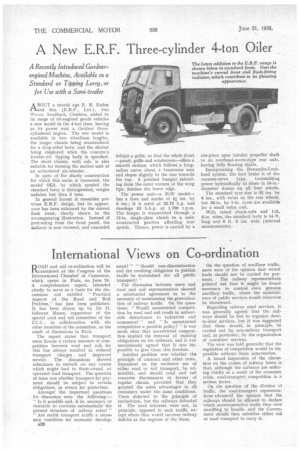International Views on Co-ordination
Page 42

If you've noticed an error in this article please click here to report it so we can fix it.
ROAD and rail co-ordination will be considered at the Congress of the International Cha.mbef of Commerce, which opens in Paris, on June 24. A comprehensive report, intended chiefly to serve as a basis for the discussions and entitled " Practical Aspects of the Road and Rail Problem," has just been published. It has been drawn up by Sir H. Osborne Mance, rapporteur of the special load and rail committee of the I.C.C., in collaboration with the other members of the committee, as the result of discussions in Paris.
The report states that transport users favour a certain measure of competition between road and rail, for this has always resulted in reduced transport charges and improved service. The discussions showed reluctance to embark on any course which might lead to State-owned or operated road transport. The question at issue was whether transport for payment should be subject to certain obligations, in return for protection.
Amongst the important questions for discussion were the following:— " /s it possible and, if so, necessary or desirable to continue substantially the present structure of railway rates? " "Are stable transport tariffs a necessary condition for economic develop n28 ment? " "Should non-discrimination and the resulting obligation to publish tariffs be maintained for all public transport? "
The discussion between users and road and rail representatives showed a substantial agreement as to the necessity of maintaining the generalization of railway tariffs. On the questions: " Would unrestricted competition by road and rail result in unbearable disturbance to industries and commerce? " and " Is unrestricted competition a possible policy? " it was made clear that unrestricted competition implied the removal of existing obligations on the railways, and it was unanimously agreed that it was impossible to give them this freedom.
Another problem was whether the principle of contract and other rates. dependent on the exclusive use of either road or rail transport, be admissible, and should road and rail concerns discriminate in favour of regular clients, • provided that they granted the same advantages to all customers under the same conditions. Users objected to the principle of exclusivism, but the railways defended it. The road interests were not, in principle, opposed to such tariffs, except where they would increase railway deficits at the expense of the State. On the question of ancillary traffic, users were of the opinion that return loads should not be carried for payment The railway representatives pointed out that it might be found necessary to control even genuine ancillary traffic, where the maintenance of public services would otherwise be threatened.
Regarding railway road services, it was generally agreed that the railways should be free to organize doorto-door services, but it was suggested that these should, in principle, be carried out by non-railway transport and, in particular, by the organization of container services.
The view was held generally that the regulation of competition would be unpossible without State intervention.
A broad impression of the discussion on the causes of railway losses is that, although the railways are suffering chiefly as a result of the economic crisis, road-transport competition is a serious factor.
On the question of the division of traffic, the road-transport representatives advanced the opinion that the railways should be allowed to declare which unremunerative traffic they were unwilling to handle, and the Government should then subsidize either rail or road transport to carry it.




























































































